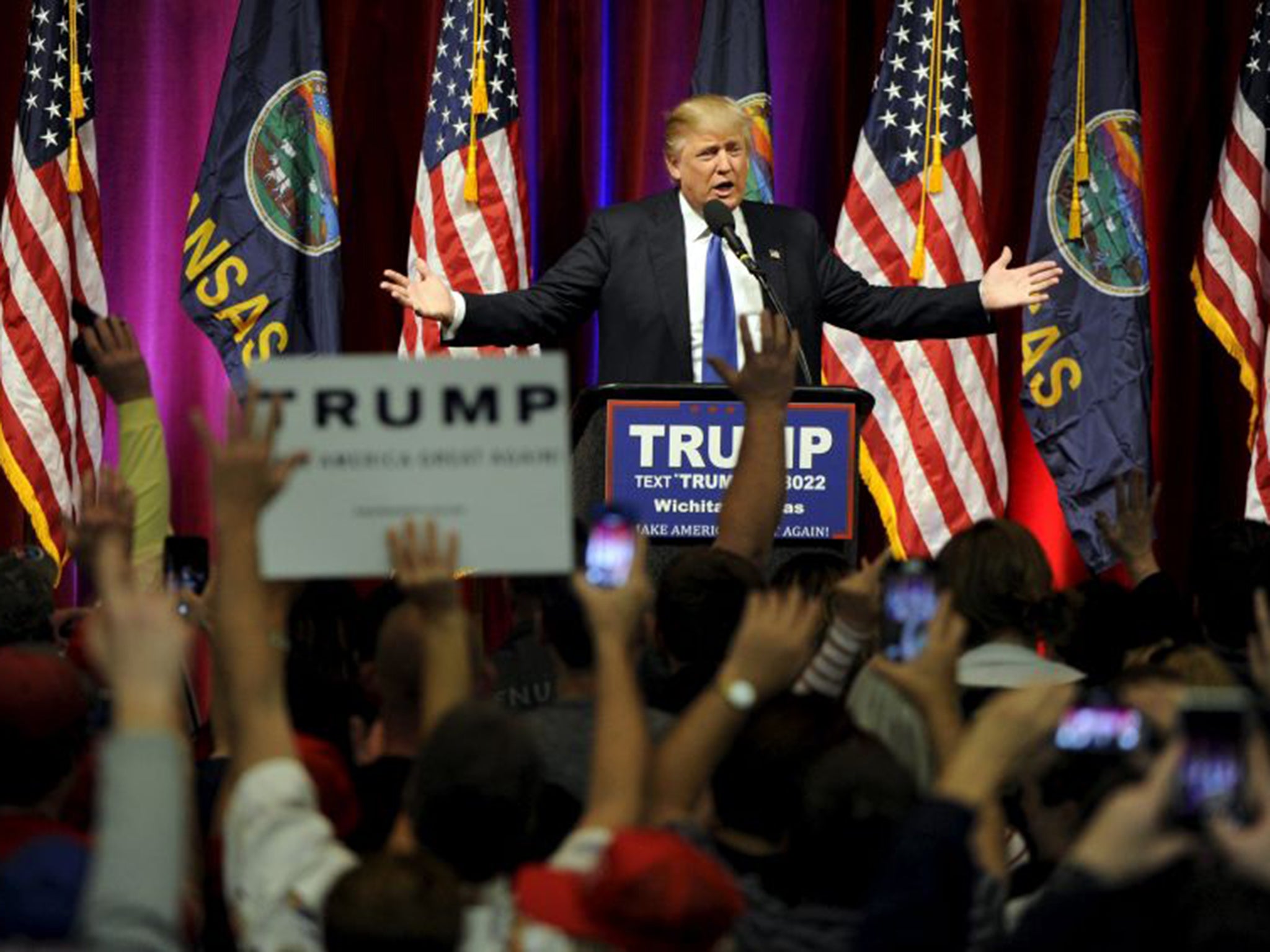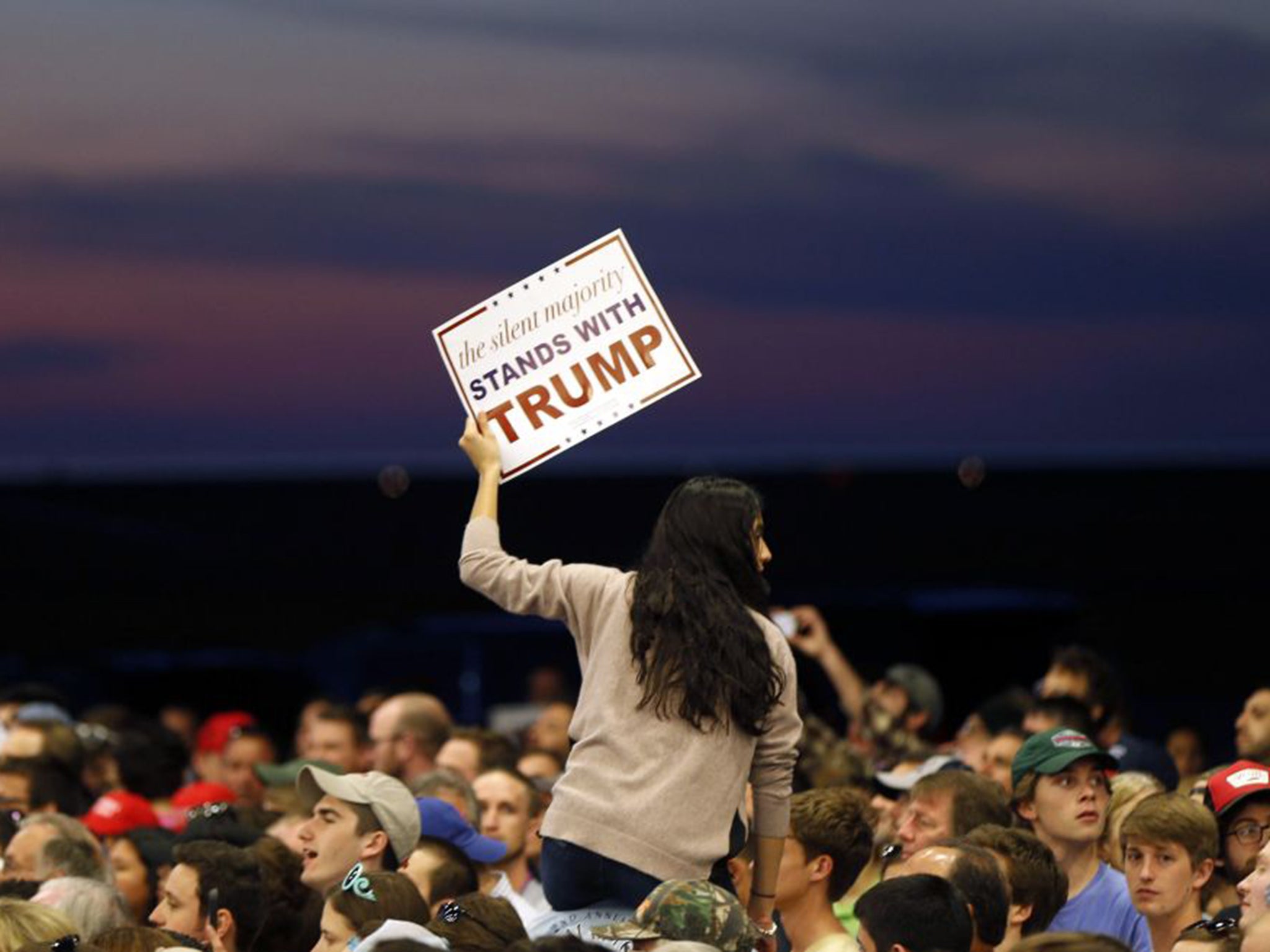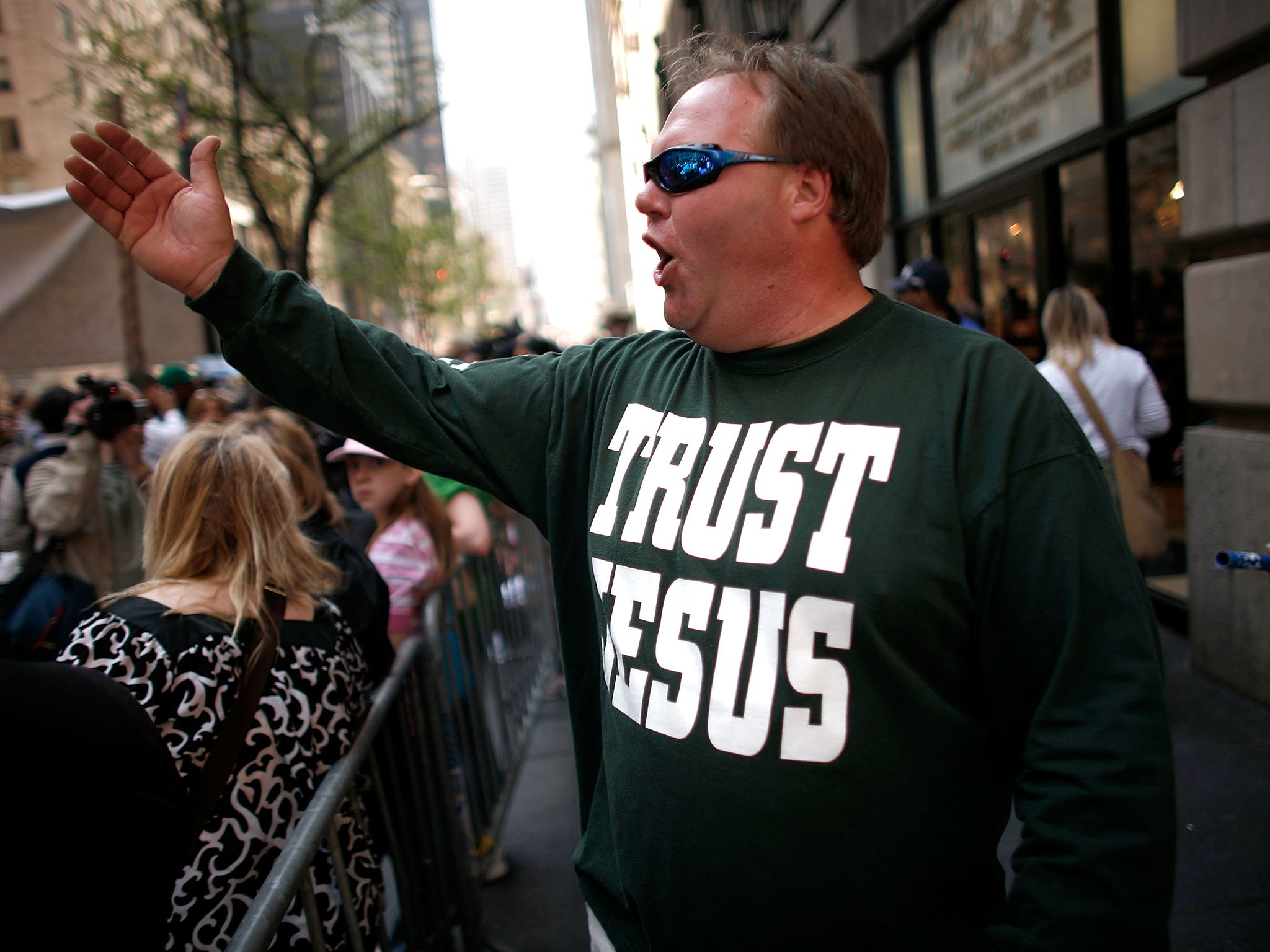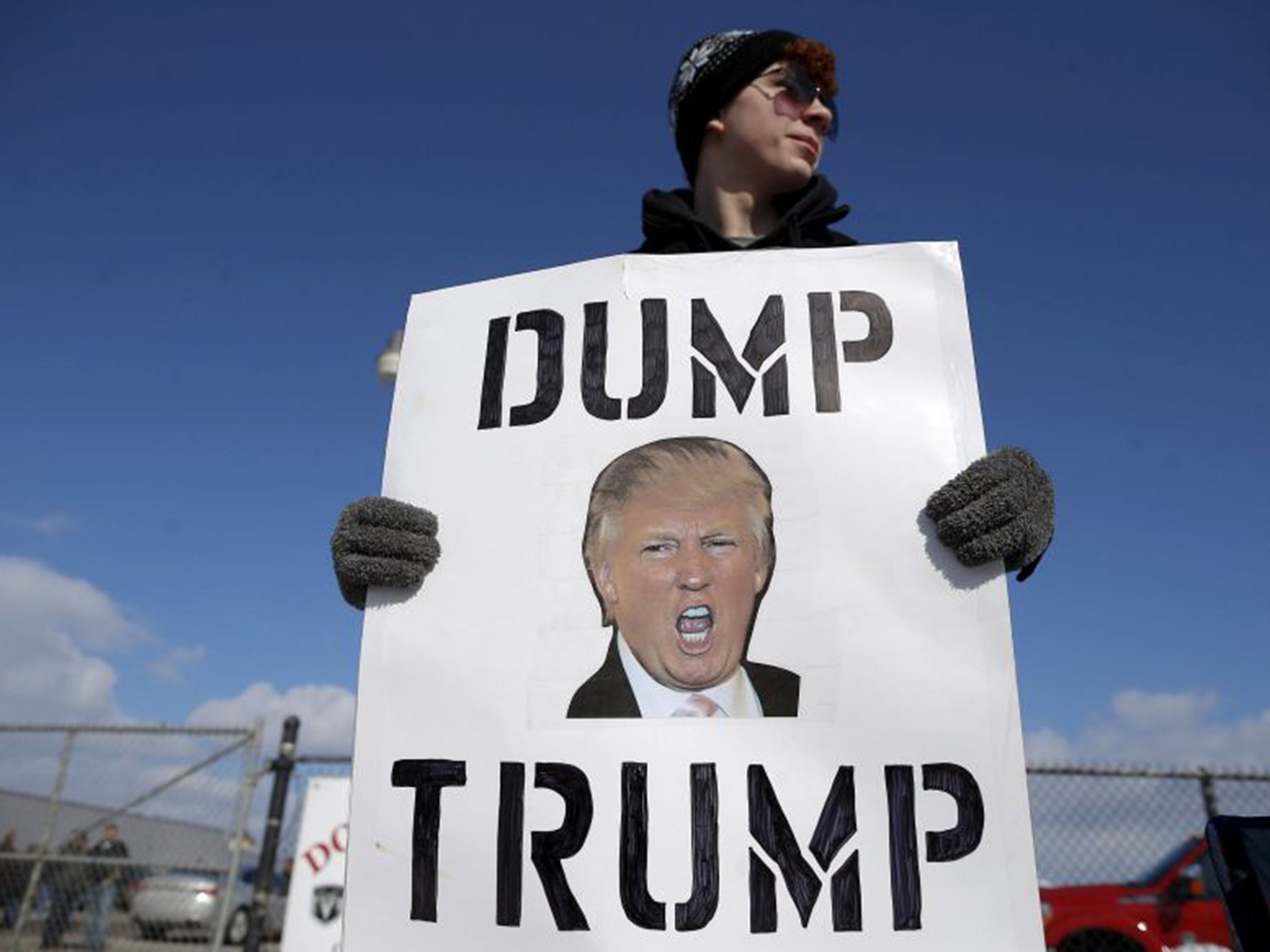Donald Trump: How the tycoon's message of racism and hatred has struck a chord with Evangelical Americans
Mr Trump has managed to appeal to their sense of alienation from the political class

Your support helps us to tell the story
From reproductive rights to climate change to Big Tech, The Independent is on the ground when the story is developing. Whether it's investigating the financials of Elon Musk's pro-Trump PAC or producing our latest documentary, 'The A Word', which shines a light on the American women fighting for reproductive rights, we know how important it is to parse out the facts from the messaging.
At such a critical moment in US history, we need reporters on the ground. Your donation allows us to keep sending journalists to speak to both sides of the story.
The Independent is trusted by Americans across the entire political spectrum. And unlike many other quality news outlets, we choose not to lock Americans out of our reporting and analysis with paywalls. We believe quality journalism should be available to everyone, paid for by those who can afford it.
Your support makes all the difference.How the hell can anyone who calls themselves a Christian vote for Donald Trump?
That’s the question that needs to be asked as this racist, misogynist hate-monger who supports torture, ridicules the disabled and wants to ban all Muslims from America, comes ever closer to winning the Republican nomination and, potentially, the White House.
The same can be asked of atheists, Buddhists, Jews, Zoroastrians and anyone else in their right mind; but it is said to be the Christians that hold the power in a nation that was built with a gun in one hand and a Bible in the other. God bless America.
And they’re the ones that The Donald must woo if he is to win the nomination and the presidency; and in particular, the group the commentators always call Evangelicals. Who are they? What do they believe in? And how can they square Trump’s vicious, rabble-rousing, violent rhetoric with what it says in the Good Book?
“Thank you Lord Jesus for President Trump,” said a placard held up by one smiling woman at a rally in Mobile, Alabama. She was a bit premature, or maybe it was a prophecy.
But whatever happened to Jesus’s second great commandment to love your neighbour as yourself? That’s also found in religions and cultures across the world. Trump whirls it around above his head and throws it out of the room faster than a heckler being chucked out by his security goons.
Nearly three-quarters of Americans believe in God. Evangelicals are those Christians who believe in the Bible as the word of the Lord (sometimes but not always literal) and Jesus as their personal saviour, who died on the cross to take away their sins.Then there’s the much wider cultural definition that takes in anyone born into or associated with Evangelical churches and organisations, from the Southern Baptists to the Mennonites and from Bible colleges that preach against evolution to civil rights groups that work for peace.

There are something like 100 million people who call themselves Evangelicals in America, making up nearly a third of the population. Not all of them are potential Trump supporters by any means.
A third are African Americans who are more likely to be Democrats; and a good few million more are members of the small but growing Evangelical left, which is horrified and ashamed of the support their fellow believers are giving Trump.
“Whether Donald Trump is a Christian or not is something between Trump and God, but his vision for America’s future and his policies are indeed contrary to the gospel. Donald Trump is an anti-Christian candidate.” So says Jim Wallis, leader of the Sojourners community in Washington DC, which campaigns for social justice. He is spiritual adviser to Barack Obama and author of a hard-hitting new book called America’s Original Sin: Racism, White Privilege and the Bridge to a New America (Brazos Press).
“It’s time to name Trump’s dangerous rhetoric for what it is. It is not only racist, but also fascist, with all the dangers that ideology implies. The truth is that we have seen this before. And it’s time to tell the truth.”
His voice is a strong one, but there are still 60 to 65 million conservative Evangelical believers for Trump to woo and it seems to be working. The question is, why?
They believe in repentance, but Trump is not repentant. His backing of the pro-life cause they support feels fake. He is undoubtedly immoral by Evangelical standards, owning a casino and strip club. He’s been divorced twice and married three times. He even said of Ivanka: “If she weren’t my daughter, perhaps I would be dating her.”
He makes fun of disability. He calls Mexican immigrants drug dealers and rapists. He won’t condemn the Ku Klux Klan. He promises to ban Syrian refugees from America. Trump wants a “total and complete shutdown of Muslims entering the United States until our country’s representatives can figure out what is going on”.
He would “bomb the shit out of Isis” and kill the families – yes, the husbands, wives and children – of terrorists. He praises the use of torture for interrogation. Jesus wept.
As The Washington Post put it: “A more scripturally, spiritually flawed man than Donald Trump would be hard to find.” And yet the same people who opposed Bill Clinton on the grounds of immorality because he had an affair are now backing Donald Trump.
“You inspire us all,” said Pat Robertson, the founder of the Christian Broadcasting Network and an influential figure in older, white conservative, Evangelical circles. Trump, in return, vows to stand by them. “We are going to protect Christianity.”
Ted Cruz is an Evangelical, but he lost their support on Super Tuesday last week, when Republicans in seven out of the 11 states voting for their candidate chose Trump. He’s promising to act like a Roman centurion outside the gate, said the Post in an editorial. “This time around, Evangelicals are not looking for someone like them. They’re looking for someone who will protect them.”
He was asking them to choose: “Who do you want out there – a choir boy or a tough guy with a loaded gun and a kick-ass demeanour?” They voted for the guy with the gun. Again, why?
They’re angry at their loss of influence during the Obama years, and feel as if America is departing from what they consider to be its founding Christian principles. They feel under siege in a country where gay marriage – which they oppose – is now legal.

“We’re being attacked. We’re literally being attacked,” one Trump-supporting church worker from Oklahoma said. This despite America being by some distance the most Christian nation on earth (however much it looks like the kind of Christianity that would turn Christ’s stomach).
Most of all, they’re pragmatic. They’re prepared to make a deal with the Devil if he protects them and their culture.
The way America thinks about God is changing. The younger you are, the more likely you are to call yourself moderate or progressive when it comes to religion, and that goes for two thirds of people aged 18 to 33, across all the faiths. But the older, white, conservative Evangelicals are the ones with the money, the organisation, the influence, the television stations and the will to power.
“America’s Evangelicals have become secular, more interested in the pursuit of wealth and political influence than fidelity to the teachings of Jesus,” says Randall Balmer, professor of religion at Dartmouth College, the Ivy League research university.
“If racism is America’s original sin, politically conservative evangelicals, neglecting the best of their tradition, have been loath in recent years to seek redemption.” They have “devolved from theological guardians to political operatives” in recent decades, he says.
The process started in the 1970s with the rise of the “moral majority” led by the preacher Jerry Falwell. His son Jerry Jnr is now backing Trump.
Back then, families who refused to watch movies because they were too worldly and who believed divorce was the Devil’s work found themselves backing Ronald Reagan, a divorced movie star. He ridiculed evolution, said he would make abortion illegal and persuaded them prosperity was a gift from God (via the White House).
Evangelicals took over the soul of the Republican Party and saw one of their own achieve office when George W Bush became president. God told him to go to war, apparently, and they supported that. They backed policies that favoured the rich over the poor. Then when Barack Obama came to power they lost influence. They lost faith in politics.
They’re ready – as one commentator put it – “to smash things up” by voting for an outsider they think will shake up the whole system in their favour.
But Peter Wehner, a senior fellow at the Ethics & Public Policy Center in Washington who has served three Republican presidents, says: “What stuns me is how my fellow Evangelicals can rally behind a man whose words and actions are so at odds with the central teachings of our faith.”
Wehner wrote speeches for George W Bush, arguably the worst president in living memory, but even he is appalled by Trump. “At its core, Christianity teaches that everyone, no matter at what station or in what season in life, has inherent dignity and worth,” he says. Trumpism defies that. “In embracing it, Evangelical Christians are doing incalculable damage to their witness.”

But as one man at a Trump rally in Oklahoma put it: “You’re voting for a president; you’re not necessarily voting for a pastor. He’s not necessarily orthodox, but I like the fact that he’s strong.”
Trump showed off his strength by starting a fight with the Pope, who he said didn’t understand the problem of America’s open border with Mexico. Trump wants to solve it with a huge wall. The Pope fought back: “A person who thinks only about building walls, wherever they may be, and not of building bridges, is not Christian. This is not the Gospel.” Trump told the Pope he’d soon come running for help if Islamic State blew up the Vatican.
For many American Evangelicals, picking a fight with the Pope is a badge of honour. Some of them really do believe he is the Antichrist. Then there are the Christians of all denominations, including Catholics, who worry that the Pope is too liberal. Nobody can say that about The Donald.
British Evangelicals are mostly baffled and embarrassed by what their fellow believers are up to in America, but few leaders here have spoken out against him.
The Archbishop of Canterbury, Justin Welby, who has Evangelical roots, gave a rather measured English response to the prospect of President Trump: “It would certainly be very challenging, wouldn’t it?”
So it’s left to Jim Wallis, on the frontline in Washington, to tell it like it is. “White Evangelical Christians who support Donald Trump are the demonstration of how racism trumps religion – pun intended,” he says.
“White has trumped Christian. Sociology has trumped theology. Bigotry has trumped the Bible. Many Christians are acting more white than Christian.”
This taps into the deep-rooted problem of racism explored in his book. “Trump’s campaign is the death knell of white supremacy, which will keep fighting for power; and he has shown that white supremacy is very much alive in America as both an ideology and an idol.”
However, Wallis does find hope in the deeper values of the American people, and those believers who are raising their voices against Trump. “The Bible says that idols separate us from God; so white supremacy separates white Christians from God. But black, brown, young and many other white Christians will help America see that our diversity is a gift and creation from God; a blessing and not a threat.”
The rest of the world can only watch and pray that he is right.
Join our commenting forum
Join thought-provoking conversations, follow other Independent readers and see their replies
Comments